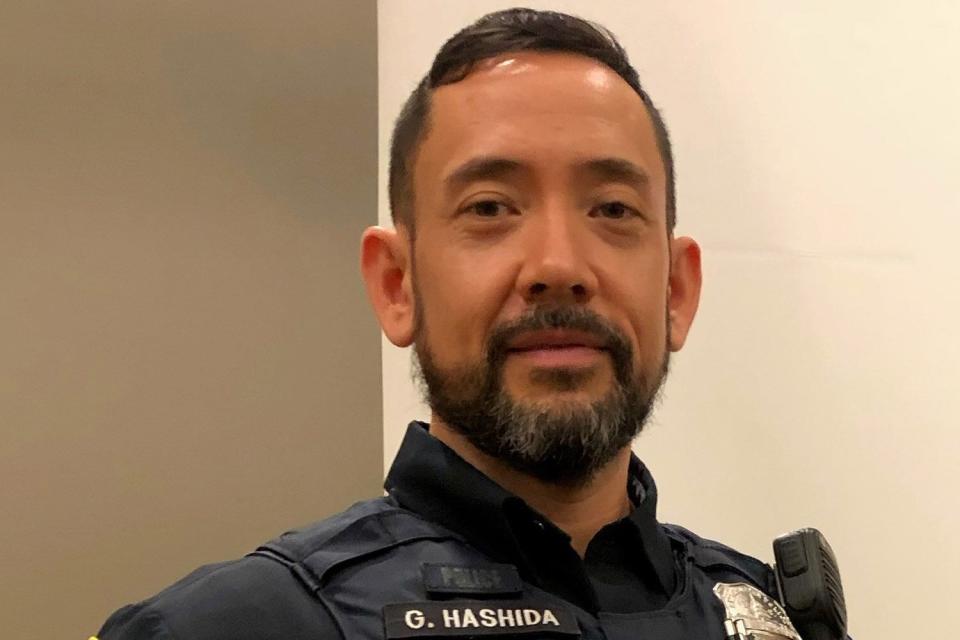D.C. Police Officer Who Responded to Capitol Riots Is Third to Die By Suicide
- Oops!Something went wrong.Please try again later.
- Oops!Something went wrong.Please try again later.
A Washington, D.C., police officer who responded to the Jan. 6 attack on the U.S. Capitol has died by suicide.
Officer Gunther Hashida was "found deceased in his residence on Thursday, July 29," Metropolitan Police Department spokesperson Kristen Metzger confirmed to CNN on Monday.
Hashida was assigned to the Emergency Response Team within the Special Operations Division. He joined the police force in 2003, Metzger wrote.
"We are grieving as a Department and our thoughts and prayers are with Officer Hashida's family and friends," the statement continued.
RELATED: A Second Police Officer Who Responded to Capitol Riots Has Died by Suicide

mountcastle funeral home
RELATED: Former Vice President Mike Pence Says He, Donald Trump Don't 'See Eye to Eye' on Capitol Riot
In a statement on social media Monday, House Speaker Nancy Pelosi wrote that Hashida "risked his life to save our Capitol, the Congressional community and our very Democracy."
"All Americans are indebted to him for his great valor and patriotism on January 6th & throughout his selfless service," she continued. "May his life be an inspiration to all to protect our Country & Democracy. And may it be a comfort to his family that so many mourn their loss at this sad time."
Hashida is the third police officer to die by suicide after responding to the failed insurrection attempt. United States Capitol Police officer and 15-year veteran Howard Liebengood and MPD Officer Jeffrey Smith also rushed to the scene of the violent riots and later died by suicide.
A fourth officer, Brian Sicknick of the USCP, died on Jan. 7 from injuries he sustained "while physically engaging with protesters" at the riots.
All Americans are indebted to him for his great valor and patriotism on January 6th & throughout his selfless service. May his life be an inspiration to all to protect our Country & Democracy. And may it be a comfort to his family that so many mourn their loss at this sad time.
— Nancy Pelosi (@SpeakerPelosi) August 2, 2021
Never miss a story — sign up for PEOPLE's free weekly newsletter to get the biggest news of the week delivered to your inbox every Friday.
In July, four Capitol Police Officers gave emotional testimonies during day one of a House Committee hearing on the Jan. 6 riots, explaining how they fought for their own lives while working to protect the building and the lawmakers inside.
Explaining how he was "assaulted and nearly killed" on Jan. 6, Officer Michael Fanone said he feared he would be "torn apart or shot to death" while he was being attacked by a "violent and angry mob."
Fanone explained how he was beaten and "electrocuted again and again and again" with a taser, while he could hear rioters yelling, "Get his gun and kill him with his own gun."

Chip Somodevilla/Getty Images From left: Sgt. Aquilino Gonell, DC Metropolitan Police Department officer Michael Fanone, DC Metropolitan Police Department officer Daniel Hodges and U.S. Capitol Police officer Harry Dunn
In an effort to appeal to the attackers' consciences, Fanone said he told them he was a father with kids at home.
"I said as loud as I could manage, 'I've got kids,' " he said. At that point, some of the rioters allowed him space and he was brought inside the building.
"I had been beaten unconscious and remained so for more than four minutes," Fanone continued. He said was then driven to the hospital by a fellow officer who had suffered his own injuries. Once there, he was told he had suffered a heart attack and was later diagnosed with a concussion, a traumatic brain injury and post-traumatic stress disorder.
Charges have been filed against more than 500 citizens accused of participating in the violent riot. Some face more serious charges, and many have not yet entered a plea. So far, three people have been sentenced for their roles in the attacks.

